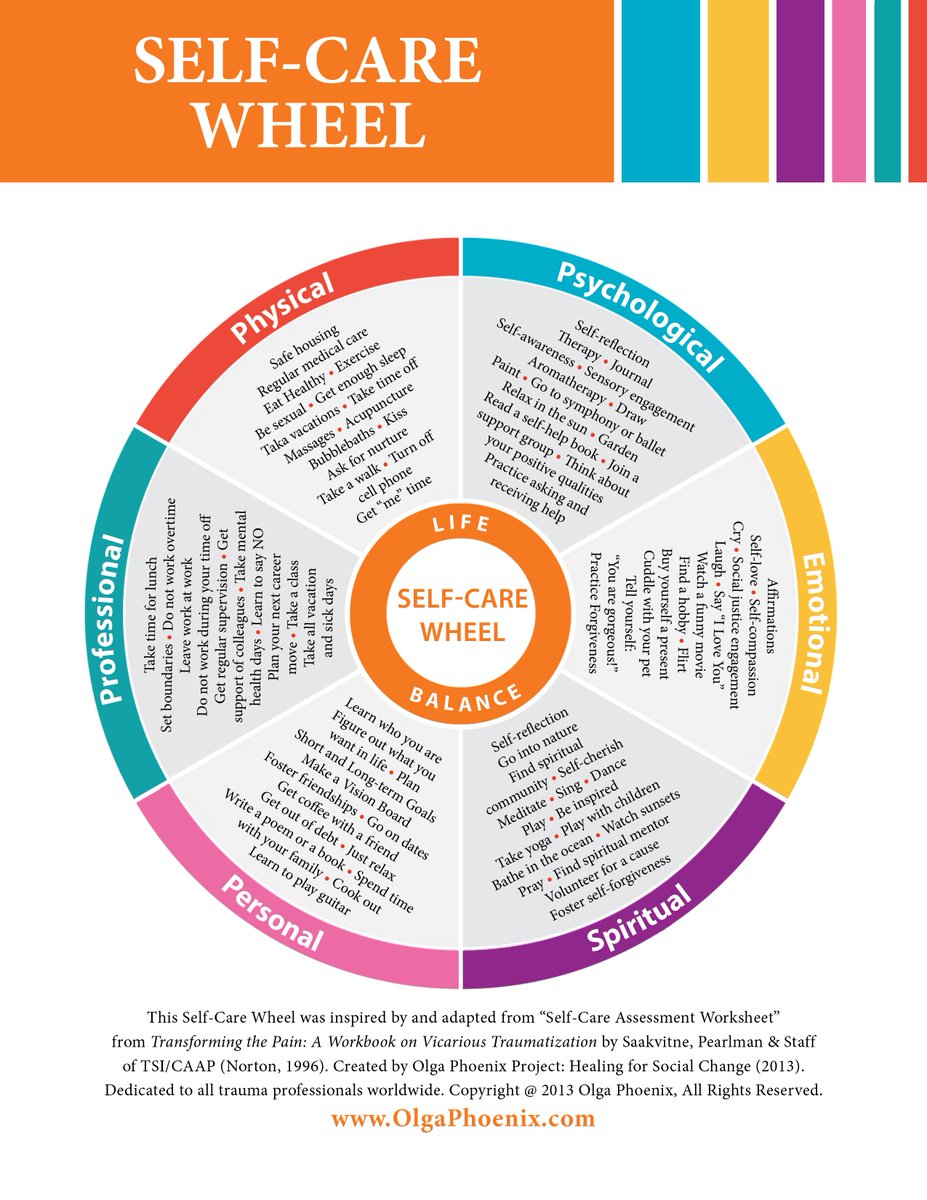Self-care is a concept that has gained significant popularity in recent years, and for good reason. It is all about taking care of oneself - physically, mentally, and emotionally. In this fast-paced world that we live in, it is crucial to prioritize our well-being and ensure that we are nurturing ourselves in all aspects of life. One effective tool to aid in self-care is the self-care wheel, which provides a visual representation of the different areas that we need to focus on.
Self-care Wheel
 The self-care wheel is a powerful way to assess and plan our self-care activities. It consists of six key areas that contribute to our overall well-being:
The self-care wheel is a powerful way to assess and plan our self-care activities. It consists of six key areas that contribute to our overall well-being:
- Physical self-care
- Psychological self-care
- Emotional self-care
- Personal self-care
- Professional self-care
- Spiritual self-care
Each of these areas is interconnected and plays a vital role in ensuring that we lead a balanced and fulfilling life.
Using the Self-Care Wheel
 One of the most significant advantages of the self-care wheel is that it can be used as a tool for assessment and planning. By reflecting on each area and rating our level of self-care in each, we can identify areas that require more attention and focus. This process allows us to develop a personalized self-care plan that caters to our specific needs.
One of the most significant advantages of the self-care wheel is that it can be used as a tool for assessment and planning. By reflecting on each area and rating our level of self-care in each, we can identify areas that require more attention and focus. This process allows us to develop a personalized self-care plan that caters to our specific needs.
The self-care wheel printable PDF is readily available online and can be downloaded for easy reference. By having a visual reminder of the different areas, we can stay accountable and ensure that we are devoting adequate time and energy to each aspect of self-care.
Benefits of Self-Care
Practicing self-care has numerous benefits that extend beyond just feeling good. It enhances our overall well-being and enables us to cope with the challenges and stressors of everyday life. Here are some of the advantages of incorporating self-care into our routines:
 ### 1. Physical Health
### 1. Physical Health
Physical self-care involves taking care of our bodies through activities such as exercising, eating nutritious food, getting enough sleep, and practicing good hygiene. By prioritizing physical self-care, we improve our overall health and well-being.
2. Mental & Emotional Health
Psychological and emotional self-care refer to activities that nurture our mental well-being and help us manage our emotions effectively. Engaging in activities such as journaling, therapy, meditation, or engaging in hobbies can significantly impact our mental and emotional health.
3. Personal Growth
Personal self-care focuses on nurturing our personal growth and development. This may involve setting goals, pursuing hobbies, learning new skills, or engaging in activities that bring us joy and fulfillment. It is essential to invest time and energy in ourselves to grow and evolve.
4. Professional Development
Professional self-care involves activities that enhance our professional growth and effectiveness. This includes setting boundaries, taking breaks, seeking opportunities for growth and learning, and prioritizing work-life balance. By prioritizing professional self-care, we ensure that our work life does not overshadow other aspects of our lives.
5. Spiritual Connection
Spiritual self-care relates to activities that nurture our inner spirituality or connection with something greater than ourselves. It can involve practices such as meditation, yoga, spending time in nature, or engaging in religious or spiritual activities. Nurturing our spiritual connection brings a sense of peace and purpose to our lives.
Implementing Self-Care Strategies
 Implementing self-care strategies may seem overwhelming, but it doesn’t have to be. Here are some simple steps to get started:
Implementing self-care strategies may seem overwhelming, but it doesn’t have to be. Here are some simple steps to get started:
1. Reflect
Begin by reflecting on your current self-care practices and identify areas for improvement. Ask yourself, “What areas of my life am I neglecting?” This self-reflection will help you determine where to focus your attention.
2. Set Goals
Set realistic and achievable goals for each area of self-care. These goals could be as simple as going for a walk every day, reading a book, or practicing gratitude. Adjust your goals as you progress and learn more about your needs.
3. Create a Routine
Establish a self-care routine that works for you. This routine should include activities from each area of the self-care wheel. Choose activities that bring you joy, make you feel relaxed, and improve your overall well-being.
4. Practice Mindfulness
Stay present and mindful when engaging in self-care activities. Be fully immersed in the moment and allow yourself to savor the experience. This will enhance the benefits you gain from these activities.
5. Seek Support
Reach out to friends, family, or professionals for support and guidance when needed. Surrounding yourself with a supportive network can make a significant difference in your self-care journey.
Incorporating the self-care wheel into your life can have transformative effects. By prioritizing self-care in all areas, you create a balanced and fulfilling life. Remember, self-care is not selfish; it is essential for your overall well-being. Take the time to nurture and care for yourself.
sources: